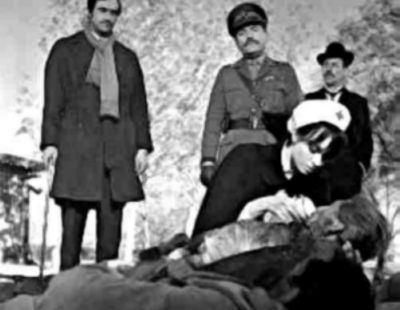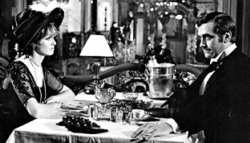

Fršulein Doktor (1969)
This obscure but well-regarded tale of espionage during World War I features Suzy Kendall as the title character, a beautiful but emotionless German spy with a morphine habit. She sinks a ship carrying Kitchener, killing him, and gives Germany a recipe for deadly gas.
James Booth plays a German double agent in love with Kendall. He's assigned to kill her and believes he has poisoned her, but her death has been faked. Eventually the English command discovers her. Booth tries to protect her, killing his boss (Kenneth More) and dying himself in the process.
Booth wears a moustache and limps around with a cane.

[Note to moviemakers: When characters go around saying Fršulein to show that they're German, they ought to pronounce the word correctly. Otherwise, it sort of defeats the purpose, doesn't it? The correct pronunciation rhymes with "Troy line," NOT with "brow line".]
Text copyright Diana Blackwell, 2002.
Appendix I
Critics' opinions, Monthly Film Bulletin
The Films of Fršulein Doktor by John W. Williams:
Excerpt from Kenneth More's autobiography, More or Less
Appendix II
From More or Less by Kenneth More, Hodder and Stoughton, 1978, p. 213, ISBN 0 340 22603 X
After this production, an Italian director asked me to make a film for an Italian company in Yugoslavia with Suzy Kendall and James Booth. This was called Fršulein Doktor, and was a movie in the old-fashioned, red-blooded manner. It was set in the first world war, with poison gas attacks, Kitchener going down in the Hampshire, German spies landing on the Norfolk coast und so weiter.
I was cast as a British Secret Service Colonel and my task was to capture the notorious Suzy Kendall, who was having it off with Germans and British alike. The plot was so complicated that none of us had any clear idea of what was going on, but we all had a hell of a good time in Yugoslavia, although I never managed to see the film afterwards and so cannot say whether our pleasure in making it was shared by the audiences who saw it.
Halfway through the filming Shrimp came out to see me, and one weekend we visited Novisad, an old Yugoslavian garrison town. Here, as elsewhere in the country, the custom was that when you have drunk from a glass you should break that glass. They actually have factories to manufacture glasses so thin and cheap that they cost almost nothing. This means that in a tavern that has seen a lot of drinking the night before, you are literally ankle deep in broken glass the following morning. The locals in Novisad also have the habit of throwing plates about when excited.
Now Angela, as you must know by now, is very Irish, and so can become excited very easily. I had further proof of that--as though I needed any--when we visited a restaurant in Novisad which had little alcoves with small tables. I was sitting in one alcove with James Booth and the camera man, and she was sitting in another with Suzy and two other people. Suddenly, from an alcove behind her, a plate flew over the partition, a big dinner plate. It came through the air liked a flying saucer. Wham! It smashed on the table in front of her. This was too much for Angela. She immediately threw a plate back. Then two more came from where one had come before--and then we were all in on it. Plates were flying through the air with the greatest of ease and by this time Angela was standing on the table! The double bass player in the band was so keen to join in that he made frantic signals to me.
"You play double bass, and I play throwing plates. Yes?"
"Yes!" I shouted, and picked up his double bass and strummed it while he joined in the game.